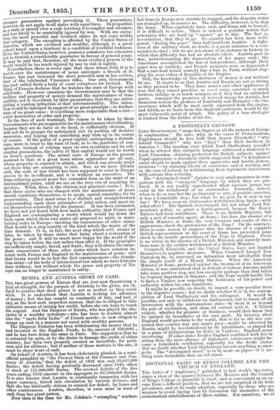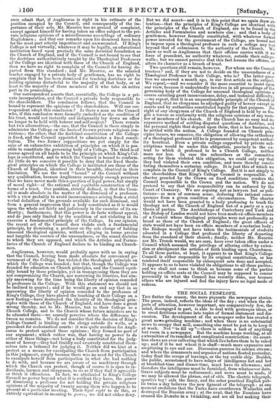DOCTRINAL BASES OF KING'S COLLEGE AND THE CHURCH OF ENGLAND.
THE letter of " Anglicanus' " published in last week's Spectator, urges a view of the quarrel between Mr. Maurice and the Council of King's College so plausible in itself, and so convenient as an es- cape from a difficult position, that we are not surprised at its wide prevalence, and at its ready adoption, especially by those who are anxious to avoid laying bare by discussion the anomalies of the ecclesiastical establishment of these realms. For ourselves, we at
once admit that, if Anglicanus is right in his estimate of the position occupied by the Council, and consequently of the im- once admit that, if Anglicanus is right in his estimate of the position occupied by the Council, and consequently of the im- portance of their acts, Mr. Maurice has no ground of complaint, except against himself for having taken an office subject to the pri- vate religious opinions of a miscellaneous assemblage of ordinary Englishmen ; and that our remarks upon his dismissal have been for the most part utterly impertinent and unwarranted. If King's College is not virtually, whatever it may be legally, an educational institution based upon precisely the same doctrinal foundation as the Church of England, and if the Council is not bound to see that the doctrines authoritatively taught by the Theological Professors
of the College are identical with those of the Church of England,
then we have no right to complain of the Council for having de- parted from this standard ; and Mr. Maurice, as the salaried teacher engaged by a private body of gentlemen, has no right to complain that he has been dismissed for teaching doctrines or for holding opinions distasteful to the majority of that body, or at least to the majority of those members of it who take an active part in its proceedings. Our correspondent asserts that, essentially, the College is a pri- vate incorporation, and the Council a private body responsible to
the shareholders. The conclusion follows, that the Council is bound to represent the opinions of the shareholders. Will our cor- respondent adopt this conclusion ? Is there a man on the Council -who, if this conclusion were formally embodied as the condition of his trust, would not instantly and indignantly lay down an office no longer to be held with honour and self-respect ? There remain but two alternatives,—the one, that the Council is there simply to administer the College on the basis of its own private religious con- victions; the other, that the doctrinal constitution of the College is fixed, and the Council appointed to administer a fixed consti- tution. The two former suppositions we put simply for the sake of an exhaustive exhibition of principles on which it is pos- sible to constitute the governing body of a College. The third is of course agreed on all hands to be the principle on which King's Col- lege is constituted, and to which the Council is bound to conform. As little do we conceive it possible to deny that the fixed theolo- gical principles on which the College is instituted are those of the Church of England, identical in their breadth, identical in their limitation. We use the word "bound" of the Council without any qualification, because Anglicanus accurately enough perceives that we have never made this a question of legal power, but simply of moral right—of the rational and equitable construction of the terms of a trust. Our position, strictly defined, is that the Coun- cil is made absolute in the matter of the dismissal of a professor, with a view probably to avoid inconveniences arising from a strict verbal definition of the grounds available for such dismissal, and from a general impression that a body constituted as it is would upon the whole act fairly and judiciously in the exercise of its au- thority; furthermore, that this power is de facto without appeal, and de jure only limited by the condition of not violating in its exercise a fundamental principle of the College. In our opinion, the recent act of the Council does violate such a fundamental principle, by dismissing a professor on the sole charge of holding unsound theological opinions, without alleging in terms precise and tangible the essence of the unsoundness, or the sound doctrine to which they are opposed, and which the Articles and Formu- laries of the Church of England declare to be binding on Church- men.
Anglicanus, however, would probably agree with us in saying that the Council, having been made absolute for convenient go- vernment of the College, has violated the theological principle on which the College was founded ; but that, though the College was founded for education on Church principles, and the Council equit- ably bound by those principles, yet in transgressing them they are not compromising the Church, nor narrowing its liberties, but sim- ply narrowing for the time being the liberty of opinion conceded to professors in the College. With this statement we should not be inclined to quarrel ; and if he would go on and say that in so narrowing the liberty of opinion conceded to the professors of King's College, they have placed the teaching of their College on a new footing—have destroyed the identity of its theological prin- ciples with those of the Church of England, and have done a great wrong thereby, not to Mr. Maurice, but to their College as a Church College, and to the Church whose future ministers are to be educated there—we scarcely perceive where the difference be- tween us remains. We do not consider that the decision of King's College Council is binding on the clergy outside its walls, or a precedent for ecclesiastical courts : it was quite needless for Angli- canus to protest against these opinions ; they formed no part of our argument; which rather was, that having no power to do either of these things—not being a body constituted for the judg- ment of heresy—they had timidly and evasively constituted them- selves into a tribunal for judging it. Neither did we hint at a protest as a means for exculpating the Church from participation in this judgment, simply because there was no need for the Church to exculpate herself from participation in what she had nothing to do with, and because we are aware of no machinery through which the Church can protest, though of course it is open to in- dividuals, laymen and clergymen, to do so if they find it agreeable or think it efficacious. In fact, we attributed to King's College Council no power beyond what it is evident they have, the power of . dismissing a professor for not holding the private religious opinions of the majority of twenty among them who happen to be present at a particular meeting. Their legal right to do this, as entirely equivalent in meaning to power, we did not either deny. But we did assert—and it is to this point that we again draw at- tention—that the principles of King's College are identical with the principles of the Church of England, are to be found in the Articles and Formularies and nowhere else ; and that a body of gentlemen, however formally constituted, with whatever formal power invested for the government of the College, are bound not to impose upon a theological professor in such a college any test beyond that of submission to the authority of the Church. We know as well as Anglicanus that their offence carries with it no force of precedent, no authority whatever, outside their college. walls ; but we cannot perceive that this fact lessens the offence, or alters its character as a breach of trust.
Two questions still remain, however. For whom are the Council trustees? and, if they are not to decide on the unsoundness of a Theological Professor in their College, who is ? The latter ques- tion we answered a month ago, in our first article on the subject. We repeat,—and we consider it the more essential to insist upon our view, because it undoubtedly involves in all proceedings of the governing body of the College for unsound theological opinions a course entailing great inconvenience, delay, and technical difficulty, —we repeat, that it is an unquestionable principle of the Church of England, that no clergyman be adjudged guilty of heresy except in courts and by authorities constituted legally for that purpose. No right of any clergyman of the Church of England is held by so fra- gile a tenure as conformity with the religious opinions of any num- ber of members of his church. If the Church has no easy and in- expensive method of settling disputed questions of doctrine, and the personal rights that depend upon them, that is her business, to be settled with the nation. A College founded on Church prin. ciples incurs, we conceive, the obligation of allowing the orthodoxy of a theological professor till he is pronounced by competent author- ity heretical. Even a private college supported by private sub- scriptions would be under this obligation precisely to the ex- tent to which it professed to be a Church College, neither more nor less. In case the subscribers or the committee acting for them violated this obligation, we could only say that they had violated their own condition, and were thereby consti- tuting themselves a sectarian college. It is just this of which we complain in the Council of King's College. But it is not simply to the shareholders that King's College Council is responsible. A charter granted by the Crown on fixed conditions renders the Council responsible to the Crown and the nation. We do not pretend to say that this responsibility can be enforced by the Court of Chancery. We are arguing not as lawyers but as poli- ticians—as men of common sense deducing the rational conse- quences from a given condition of circumstances. The charter would not have been granted to a body professing to teach the theology not of the Church of England but of a party or a syn- thesis of parties. The Archbishops of Canterbury and York and the Bishop of London would not have been made ex-offieio members of a Council whose theological principles were not professedly as broad as those of the Church of England; the great officers of state would not have been ex-officio members of a sectarian body ; the Bishops would not have taken the testimonials of students educated in a College that professed the liberty of departing from the standard of their church ; finally, neither Mr. Maurice nor Mr. Trench would, we are sure, have ever taken office under a Council which assumed the privilege of altering either by exten- sion or abridgment the articles of faith binding upon Churchmen. To all these parties, at least, it appears to us that King's College Council is either responsible by its original constitution, or has rendered itself responsible by subsequent acts done and accepted. It appears to us to have violated its obligations to all these parties; and we shall not cease to think so because some of the parties holding ex-officio seats at the Council may be supposed to concur personally in what the Council has recently done, nor because others who are injured and feel the injury have no legal mode of redress.





































 Previous page
Previous page